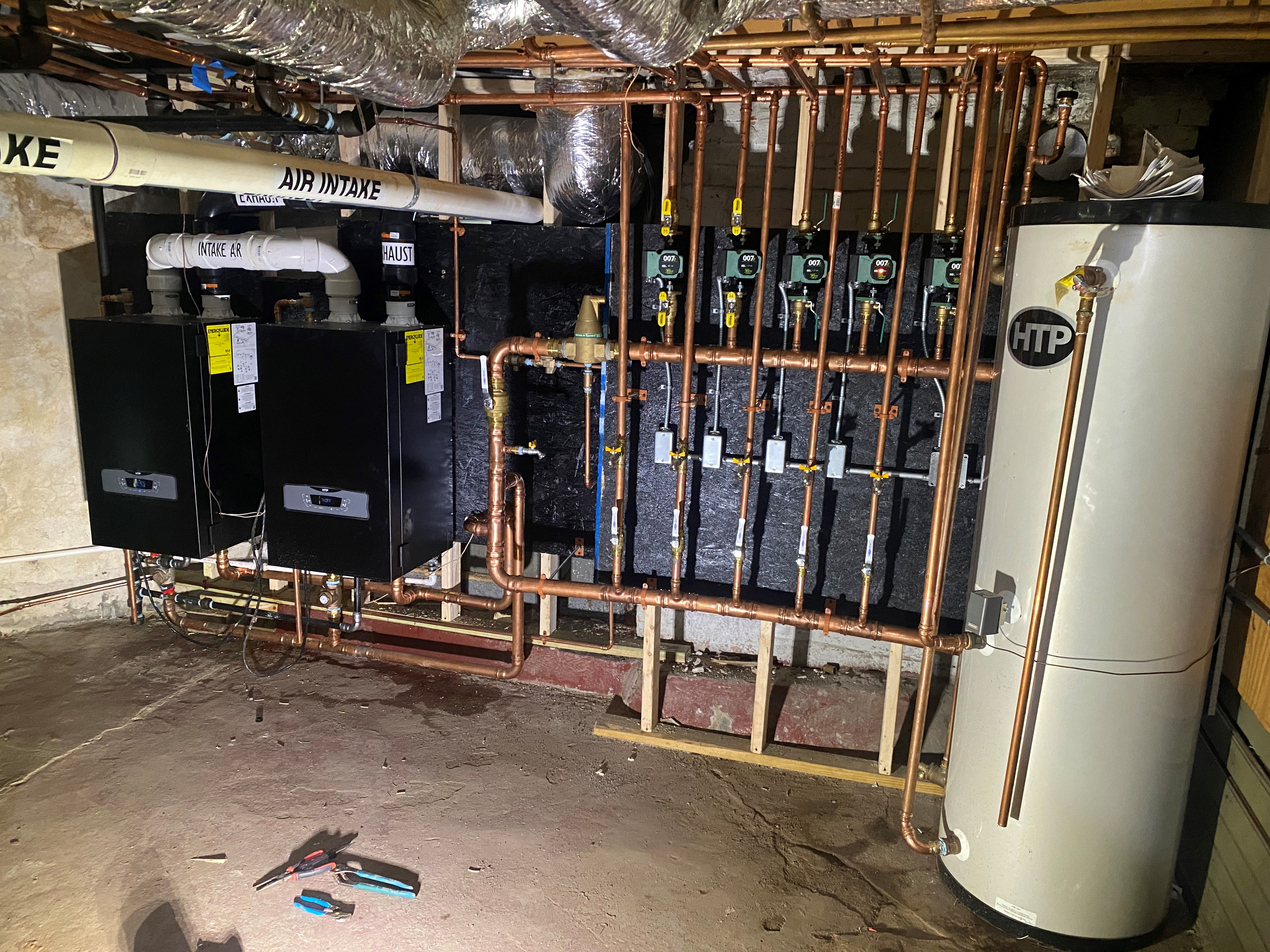Indirect water heaters are valued in large part for their efficiency in water heating. They require less energy, so homeowners save money on utility bills. For that reason alone, indirect water heaters are a terrific option.
However, there are other reasons why most homeowners will appreciate indirect water heaters for their homes. They require less maintenance, are durable, offer lower installation costs and deliver hot water in a hurry. In a frenzied world where every second counts, waiting minutes for hot water to arrive for a morning shower can add stress to an already jam-packed day.
While there are certainly some disadvantages, for many homeowners, indirect water heaters may be the best choice for their hot water needs.
What is an indirect water heater?
An indirect water heater uses the boiler to heat a fluid that circulates through the storage tank.
No heating elements are inside the water tank itself. Instead, the home’s space-heating system — a boiler — heats the water indirectly by heating the fluid that is piped through the water tank. Because an external source heats the water instead of its own gas or electric heating elements, the system requires two units to work together.
Indirect systems can be fired by gas, oil, propane, electric or solar energy. Any of those sources also could be used in combination.
Direct water heating systems keep water in an interior tank. Water is heated by a gas or oil burner that is part of the same unit.
An efficient choice
Indirect water heaters offer several advantages, but the most important is efficiency.
The units use a home’s boiler as a heat source. As a heat exchanger is used to heat water with the space-heating unit, indirect water heaters take advantage of the same energy used to heat the air indoors. The heated water is stored in tanks, so furnaces are required to cycle less frequently, saving energy and money.
In most instances, indirect water heaters provide almost instantaneous hot water. They can store between 30 and 200 gallons of water and produce two to three times as much hot water as a standard heater.
Indirect water heaters also have a longer life span and are easier to maintain. There are no elements to burn out, and most units can be constructed out of stainless steel. With fewer maintenance costs and more efficiency compared to direct water heaters, owners can realize significant money savings over the unit’s lifetime.
One other important benefit: indirect water heaters offer better safety. According to the National Fire Protection Association, they carry minimal fire risk as they have no active heat source.
Hard decision
While indirect water heaters are a good choice, there are instances where a direct water heater may be the better option.
First, an indirect water heater can only be used in combination with a hydronic heating system. If the house is heated using steam or forced hot air, the indirect is no longer an option.
Hard water can negatively impact heat transfer. For homeowners, that means it may take a bit longer to receive hot water. In addition, sediments and minerals can build quickly, leading to more frequent maintenance.
The requirement for a water tank also chips away at floor space. Tankless water heaters can be installed on walls, thus having a far smaller footprint. An indirect water heater takes 80 percent more space than a tankless water heater.
An indirect water heater may not be the best choice for smaller homes and families. The hot water and energy will get wasted if it remains in the tank. In those instances, electric tankless water heaters might be more suitable.
Indirect options
While manufacturers won’t offer as many options as a hardware store might in finding the precise shade of pink for your daughter’s bedroom, there are some choices.
HTP’s SuperStor Ultra and SuperStor MAX include lifetime warranties. Both models are highly efficient, boasting three to five times more recovery than conventional gas-fed water heaters.
HTP’s SuperStor Contender delivers significant volumes of domestic hot water and includes a ceramic-coated, smooth-surface coil design that resists hard-water buildup. The high-efficiency indirect water heater is slush-coat glass-lined.
Which system a homeowner might select comes down to the size of the home, demand and budget. A professionally licensed and experienced installer will help homeowners find the right choice for their homes.
Energy conservation has been increasingly important, and indirect water heaters offer the most efficient water heating solutions.
All situations vary, and homeowners need to work with their contractors to make sure an indirect water system is the right choice for their residences. In the long run, it will likely bring significant energy and money savings to the homeowner.
Jason Alpert is a technical support senior manager at Ariston Thermo USA. A graduate of Worcester Polytechnic Institute and Norwich University, Alpert has more than two decades of expertise in providing technical support.





